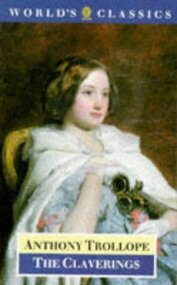
As is often the case with Trollope’s novels, The Claverings (1867) is an uncomfortable yet compelling read. The hero of the piece is Harry Clavering, who is jilted by the beautiful Julia Brabazon in favour of a dissipated, but rich, old aristocrat, Lord Ongar. Clavering devotes himself to a career as an apprentice civil engineer and becomes engaged to his master’s daughter, Florence Burton. He looks set for a successful family and business life until the widowed Julia Brabazon, now Lady Ongar, reappears. He must choose between a safe but predictable life with Florence, or the glittering and indolent role of Julia’s husband.
Harry’s endless vacillation is contrasted with his steady, but slightly Pooterish, prospective brother-in-law, Thedore Burton. Although he has a rather prissy tendency of polishing his shoes with his handkerchief and making gravy at the dining table, he is a civil engineering pioneer, working on both the Russian railway and the London underground. The contrast is felt most strongly, however, between Harry and the two women vying for his affection. It is difficult to understand what they see in him, unless he is stood alongside his unreconstructed cousins, Hugh and Archie Clavering.
Julia Brabazon is by far the most engaging character and should be the heroine of the tale; instead she is punished for behaving as good Victorian girls should, by making an advantageous marriage. Calumny damages her reputation, as does Harry’s cowardly behaviour. Although she admits her faults and behaves with dignity throughout, she is not allowed to be happy. Here Trollope shows toe-curling timidity, although he was amply rewarded by the periodical reviewers, who praised the “true and natural punishment” of Julia’s “sin”. In the novel itself, this view is articulated by Cecilia Burton, Florence’s sister-in-law, who is quick to forgive Harry, but much quicker to blame Julia. Men can err, but women must be spotless.
Julia is placed in an invidious position, one similar to that in which many Trollopian heroines find themselves. Although she has suffered one unhappy marriage, her family are keen to bundle her into another as quickly as possible in order to suit their interests. When trying to escape a particularly importunate suitor, she threatens to throw herself off a cliff, and the reader is left in no doubt that she would do so. Marriage for these women is a business contract, although they are still expected to love their husbands, no matter how rebarbative they might be. Various subplots involve unpleasant men trying to browbeat women into marrying them. They have little agency and their happiness is of secondary consideration. Harry Clavering, on the other hand, is a snivelling invertebrate who is ultimately rewarded for his indecisiveness and inertia.
Trollope is at least critical of the landed gentry, but from a safe distance of upholding the “natural order” at the novel’s conclusion. The Burtons seem to be building their own civil engineering dynasty to rival the aristocratic Claverings, although theirs is based on hard work rather than inherited wealth. Whereas the Claverings produce only one puny child, the Burtons are reliably fecund and look set to endure, constructing great transport links, rather than sinking all their money into crumbling mansions. Trollope shows both strength and pusillanimity in this novel and I can’t help but feel equivocal. In the introduction, David Skilton declares it to be “a piece of Trollopian perfection”. I cannot agree.
The Claverings by Anthony Trollope